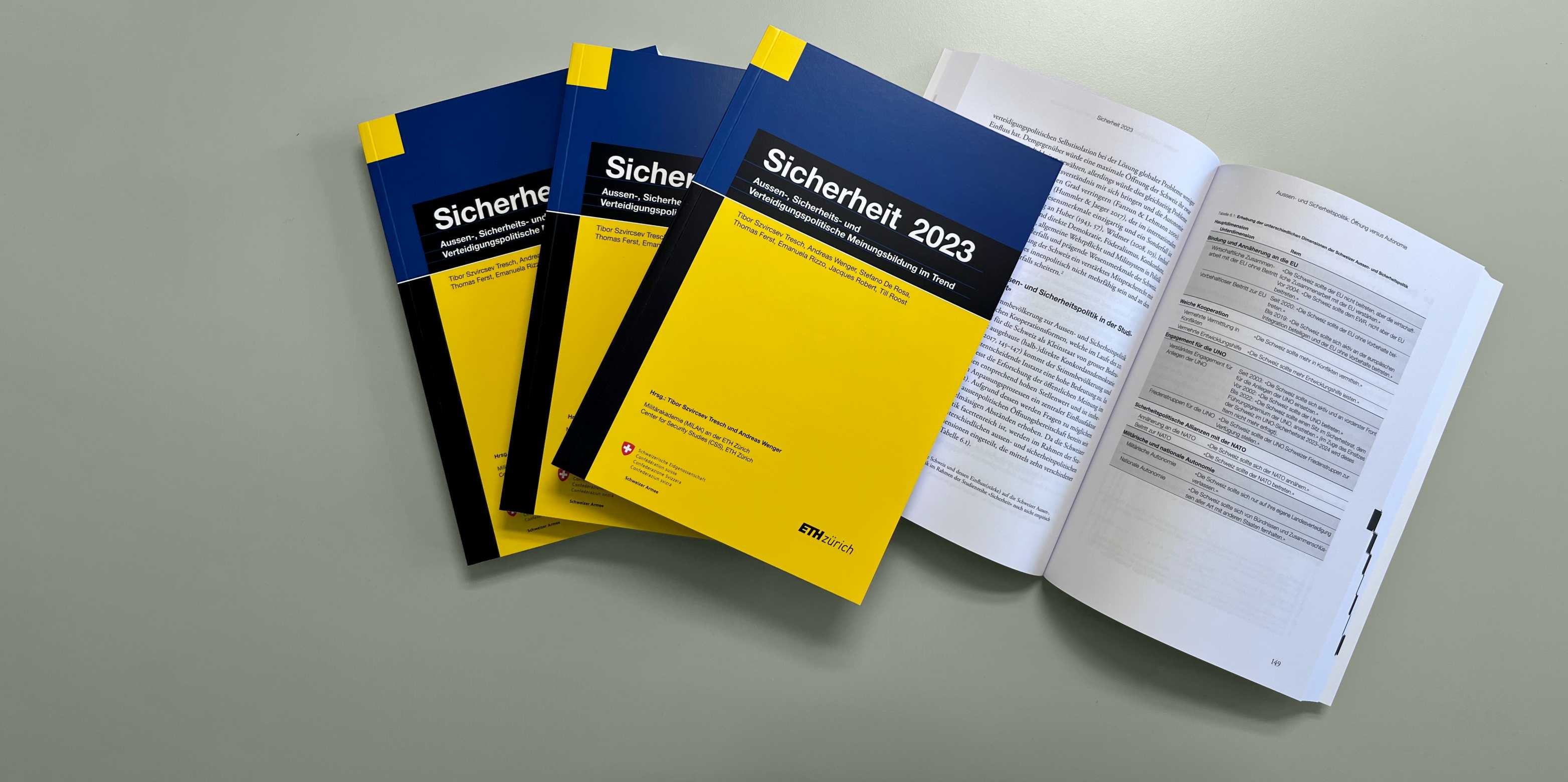Sicherheit 2023: Aussen-, Sicherheits- und Verteidigungspolitische Meinungsbildung im Trend
The Military Academy at ETH Zurich and the Center for Security Studies at ETH Zurich have published the survey «Sicherheit 2023». Since 1999, the annual study has evaluated long-term trends and tendencies in public opinion on foreign, security and defense policy issues in Switzerland.

This brief summary presents the results of the questions collected in January 2023 as part of "Security Study 2023" and compares them with the results of "Security Study 2022" (January 2022). Partial reference is also made to a follow-up survey in June 2022.
Expectations about the Future and General Security: The Swiss are significantly less optimistic about the future in January 2023 than they were in January 2022. 81% (–5 percentage points;Pp) are optimistic about the future of Switzerland and 24% (–7Pp) are optimistic about the future of the world. This decline in optimism is almost certainly due to the outbreak of war in Ukraine in February 2022. However, despite the war, the public’s general sense of security remains high. In January 2023, 94% of respondents feel secure, which corresponds to the values from the surveys in January 2022 (±0Pp) and June 2022 (±0Pp).
Trust in Institutions and Selected States: Trust in institutions continues to remain high. None of the institutions surveyed have lost trust compared to last year. In comparison to last year (January 2022), only political parties have gained in trust (+0.2). Trust in selected states was last measured in 2019. Switzerland’s neighbours continue to enjoy a high level of trust. The Swiss trust the USA significantly more than they did four years ago. The loss of trust in authoritarian states (China, Iran, North Korea, Russia) is particularly striking and in some cases significant.
Threats from the Perspective of the Population: In "Security Study 2023", an open question was asked for the first time about the three greatest threats to Switzerland. Voters predominantly see wars and conflicts (42% of all interviewees), climate change and environmental destruction (34%) and financial and economic crises (31%) as the greatest current threats to Switzerland. All other issues are far behind, with less than 15% of all interviewees.
Foreign and Security Policy: Purely economic relations with the EU continue to be desired and accession to the EU is only demanded by a minority. Soft cooperation (conflict mediation and development aid) continues to enjoy majority support. Increased Swiss involvement in UN affairs is once again more popular than in June 2022. A narrow majority (55%, +10 Pp compared with January 2021) of respondents calls for closer ties with NATO, while membership remains a minority concern. A narrow majority believes that neutrality allows Switzerland to plan its military defense with NATO. Support for military and national autonomy has fallen significantly. It is evident in 2023 that Swiss people are more willing to open up and to cooperate than in previous years.
Neutrality: Compared with January 2022, the neutrality principle is less strongly supported, but still receives very high approval at 91% (–6Pp). While "differential" neutrality – taking a clear stance in political conflicts but remaining neutral in military conflicts – continues to be supported by a narrow majority, the wish to also take a clear stance in military conflicts abroad has risen from 18% (in January 2021) to 27%. Although support for the solidarity and identity function has declined, neutrality remains a primary goal of foreign policy and a value in itself for the majority of the population. While support for the security policy function of neutrality has dropped significantly within a year from 69% to 55%, the protective effect of a military alliance in Europe is more strongly approved of and demanded by a good third of respondents. Overall, the Swiss take a similarly critical view of neutrality as they did in June 2022.
Importance of the Characteristics of Neutrality: The seven characteristics of neutrality last surveyed in 2014 are considered important by a majority of the population. In particular, it is very important to the Swiss that neutrality is internationally recognized, exhibits humanitarian concerns and is part of Swiss identity. The characteristic of neutrality being armed is the least important.
Sanctions Against Russia: Compared with June 2022, attitudes regarding Swiss sanctions against Russia remain unchanged in January 2023. Three quarters of respondents are convinced that the sanctions are justified and 70% see them as compatible with neutrality. Around a third share the opinion that Switzerland can no longer offer its Good Offices as a result of the sanctions.
Defense Policy: Compared to January 2022, the Swiss want to strengthen the defense capabilities of the armed forces. A clear majority believes that the armed forces should be fully equipped and 78% (+3Pp) consider the military to be necessary. The view that Switzerland spends too little money on defense is currently more widespread than it was in the January 2022 survey – i.e., before Russia’s attack on Ukraine. Nonetheless, compared to the June 2022 survey, the support for an increase in defense spending has fallen. The Swiss still clearly support conscription and the militia principle, and are satisfied with the performance of the armed forces.